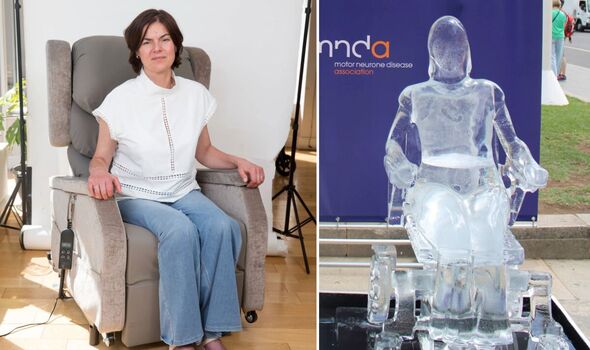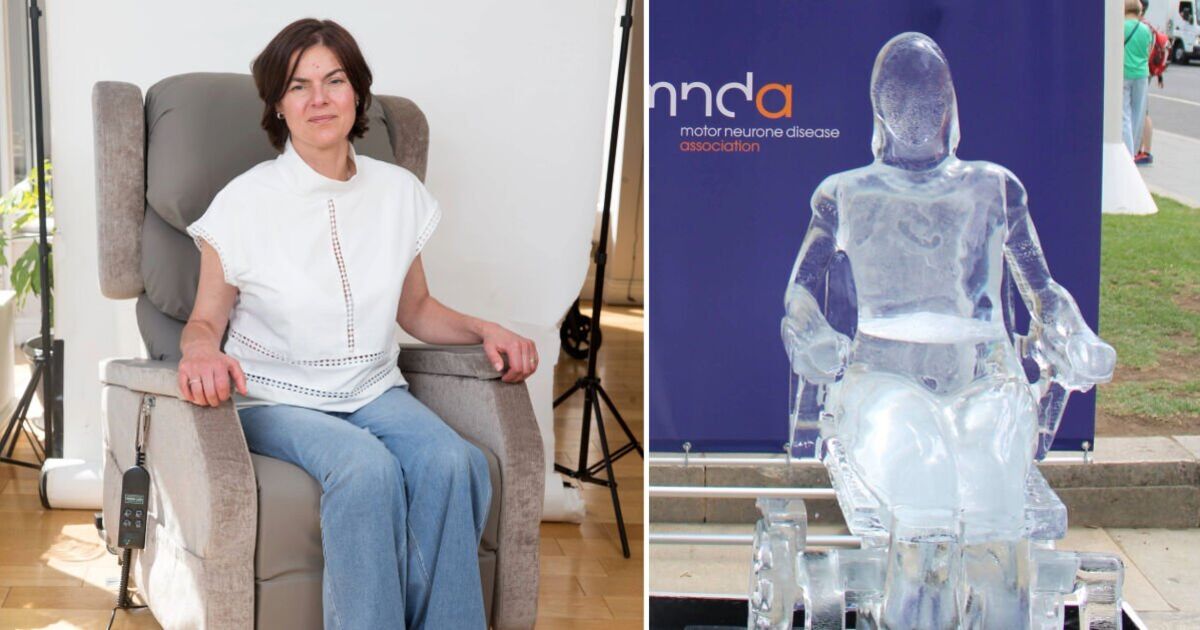
An ice sculpture of Seckin represents how time is running out (Image: MND Association)
Every drop of water that fell from a melting ice sculpture of Seckin McGuirk in Parliament Square on Thursday was a heartbreaking reminder that time is running out. The former maths teacher, 57, has motor neurone disease which is slowly robbing her of her independence, mobility and ability to speak. A drug exists which could slow or even halt the progression of her symptoms.
But, although it is being offered to the NHS for free by the manufacturer while it is evaluated by regulators, no hospital near Seckin will pay for the bed and care needed to administer it. Seckin told the Daily Express: “It’s extremely frustrating. MND is one of the most awful diseases that a human being could have to face. Your body is dying, slowly, and you live in it and can’t do anything about it. Then you find out there is a drug which may help and could actually stop the progression. But every day you wait, you are losing something.”
Read more: Motor neurone disease affects one in 300, but hope for treatment is growing
The life-changing drug, tofersen, can help around 2% of MND patients who have a specific form caused by the SOD1 gene mutation. Mum-of-one Seckin was diagnosed with MND in June 2024 and had her gene mutation confirmed last November.
The first sign that something was wrong appeared during a holiday to Turkey many months earlier, when she went for a run along the beach and noticed discomfort in her hip.
In the months that followed she found herself tripping over and unable to walk, Seckin said her diagnosis was “terrifying” and she was initially in denial, but with her husband’s help she started looking into treatments.
The SOD1 gene codes for a protein that helps to break down byproducts that can damage cells. Mutations cause the protein to form clumps within motor neurons, which can interfere with healthy cell functions or cause other proteins to lose their function.
Tofersen stops the production of toxic SOD1 proteins. An initial 28-week clinical trial did not show significant benefit, but an extended study found that patients who took toferson had lower levels of the SOD1 protein, lower markers of nerve damage and slower progression of symptoms.
The drug is being assessed by the Medicines and Healthcare products Regulatory Agency and the National Institute for Health and Care Excellence, which will decide whether it should be routinely available on the NHS.
In the meantime, manufacturer Biogen is offering it free of charge through an early access programme. Availability depends on local hospital trusts having capacity to administer the treatment.
Seckin, of Rugby in Warwickshire, said: “I wrote to all the professors [whose hospitals are offering the drug] introducing myself and my condition, and asking if I could be part of the early access programme.
“Most of them came back to me and they all said the same thing — capacity was full and they could not accommodate any other patient.”
The Motor Neurone Disease Association (MNDA) estimates that around 30 patients are receiving tofersen but Seckin is one of a dozen being denied access.
The care needed to administer the drug — which requires a monthly lumbar puncture in hospital — is thought to cost between £15,000 and £30,000 per patient per year.
Seckin has looked into covering the costs herself but it is impossible to get a private prescription as tofersen has not yet been approved by regulators.
She is haunted by the thought that, if she had accessed the drug soon after her symptoms began, the disease’s progression could have been halted. “I could still be walking. I could have carried on working, I could have carried on with my life,” Seckin said.
“Now, I’m wheelchair bound, I can’t use my hands 100%, my voice is trembling. I’m just losing all my independence, bit by bit, and it is irreversible.
“We are still fighting, trying to explain this. People need that drug. It’s just a matter of administration and I cannot understand how this cannot be organised for a small amount of money.”
Seckin is in touch with other SOD1 patients including some who are accessing the drug and said it is bittersweet to hear of the benefits.
She explained: “It’s amazing to have that hope because having hope is still something, rather than thinking ‘this is it’. I still can’t get over the thought that if everything had been done swiftly, I could still be working and carrying on with my life.
“And I wouldn’t be in this position where I can’t make long-term plans because I don’t know what the future holds. It makes it even more frustrating, disappointing, heartbreaking. The slow process is a terrifying part of this illness.”
Seckin’s fight is backed Richard and their son Aiden, who is studying chemistry at Imperial College London.
Richard said the battle for tofersen was one Seckin should not have to fight. He added: “Our lives have changed so much since March 2023. It’s an emotional and physical roller coaster of unpredictable change. But for me it’s nothing compared to what Seckin is going through. That is the real challenge.
“Lots of things we took for granted are now logistically so much harder, often only exacerbated by the lip service paid to accessibility.”
Richard added: “When I see some of the spending reported by the NHS and Government, I cannot fathom that they will not fund an increase in the capacity for Tofersen for Seckin and the other SOD1 MND patients. It is shameful. Seckin and the others need this drug. Action is needed now.”
The MNDA commissioned the life-sized ice sculpture of Seckin to remind ministers that desperate patients do not have time to waste. It is urging the Government to step in and help all those who could benefit to access the drug.
Campaigners also delivered a petition signed by more than 20,000 people to health minister Karyn Smith at the Department of Health and Social Care.
Richard Evans, the charity’s director of engagement, said it was “self-evidently unfair that the NHS is giving it to some people who would benefit from it, and not to others”.
He added: “This drug, which is being given for free, can be the difference between life and death for people with SOD1 MND.
“People with SOD1 MND being refused tofersen cannot wait for this approval process to run its course, as some may even not be with us any more by the time it is finished.
“We are talking about a small amount of resource that could literally be the difference between life and death for these people.
“We the MND Association, alongside the members of our MND community, call on the Government to meet with us and find a solution to this blockage.”
A DHSC spokesperson said: “Our thoughts are with all those living with this debilitating condition. The MHRA is currently reviewing this treatment rapidly for quality, safety, and efficacy, for use in the United Kingdom.”

